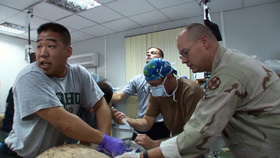|
WASHINGTON, May 17, 2006 – The new HBO documentary film "Baghdad ER" is much more than just a series of gruesome images flickering across a screen. It is a poignant testament to the sacrifice of American troops and the dedication of military medical personnel.

Medical personnel work on a patient in a scene from HBO's documentary film "Baghdad ER." Photo courtesy HBO
(Click photo for screen-resolution image);high-resolution image available. |
|
Filmmakers Jon Alpert and Matthew O'Neill were given eight weeks of unfettered access to the Army's 86th Combat Support Hospital in Baghdad during the spring and summer of 2005. The result is a compelling film that examines the daily rigors faced by doctors, nurses, medics and chaplains as they treat wounded troops.
The film also includes frontline rescue footage of the 54th Medical Company Air Ambulance Team, as well as soldiers patrolling the streets of Baghdad, and is interspersed with surprising moments of humor.
Army Col. Casper P. Jones III, commander of the 86th Combat Support Hospital, told American Forces Press Service that the film captures the reality of what goes on at the hospital.
"I think it's an accurate depiction of the medical facility. I think it gives a real-life view of what it's like in a trauma center in a combat zone," he said. "I think it shows the physicians, nurses and technicians, and our chaplain involved in compassionate caring and world-class health care."
Sheila Nevins, head of HBO's documentary film division, said the film has no political agenda, and is simply meant to celebrate the heroism and bravery of the men and women in uniform.
"That might sound very cliché and trite, but for whatever it's worth, I'm humbled by their courage," she said at a screening of the movie at the Smithsonian Institution's National Museum of American History here May 15th.
The main mission of the combat support hospital is to stabilize wounded troops in order to transfer them out of Iraq to receive further treatment, Jones said. He called the unit's primary mission "resuscitative care."
"Our job is to save life, limb and eyesight, to stabilize and move the patients," he explained.
Patients are usually transferred from Iraq to Landstuhl Regional Medical Center, Germany, and then on to Walter Reed Army Medical Center here. The transfer usually happens within 36 hours, Jones said.
Iraqi civilian patients are moved into the Iraqi health care system, he added.
The colonel said the survival rate for wounded U.S. troops is the highest in history. "I hope when people view the film, they come away with a definite sense of confidence that the medical care we provide to our wounded warriors is the best in the world," he said.
Army Sgt. Jeffrey Beltran, who was treated during filming, agreed with Jones' assessment. Beltran was injured May 29, 2005, when his convoy was hit by an improvised explosive device. The makeshift bomb shattered his left knee, broke his fibula, and peppered his body with fragment wounds.
"The hospital staff was very professional," Beltran said. "I think we have the best military care in the world. The medical units that are deployed over there should be commended because they've saved a lot of lives."
Army Dr. (Maj.) Merrit Pember, who also appears in the film, said he felt the film was an accurate portrayal of what it was like to work at the medical facility.
"I thought it was a good film. I thought it accurately portrayed what was going on there on a routine basis," he said. "I also thought that it really showed how well wounded soldiers are cared for."
Pember said his deployment to Iraq was the most challenging medical experience of his life. "I had never seen that degree of trauma. The energy behind the wounds I was seeing over there kind of took me by surprise initially," he said.
"It's a biased opinion, but it's the best trauma facility I've ever seen," he continued, "from the battlefield to the operating room in an hour with every asset possible mobilized to save everybody that came through the door."
The doctor said he came away from his experience in Iraq with newfound admiration for American warfighters. "I certainly developed a whole new respect for these guys," he said. "Even after they're wounded, which you see in the film, they're ready to get back out there and do their job. I find that very impressive."
Jones said he also was impressed by the dedication and commitment demonstrated by the injured troops. "Let me tell you something, when you're down there in the emergency room, the first thing most of the soldiers and Marines ask about is their buddy," he said. "They want to know how they are. That's the first thing out of their mouth."
The colonel said the most interesting and touching moment during his command came when an insurgent complimented the American doctors who had treated him. "Through a translator he said, 'I never knew Americans were so good.' That speaks volumes for what Army medicine is doing as we prosecute this war on terror," Jones said.
Baghdad ER will air on HBO Sunday, May 21, at 8.p.m. It contains graphic images and adult language.
|